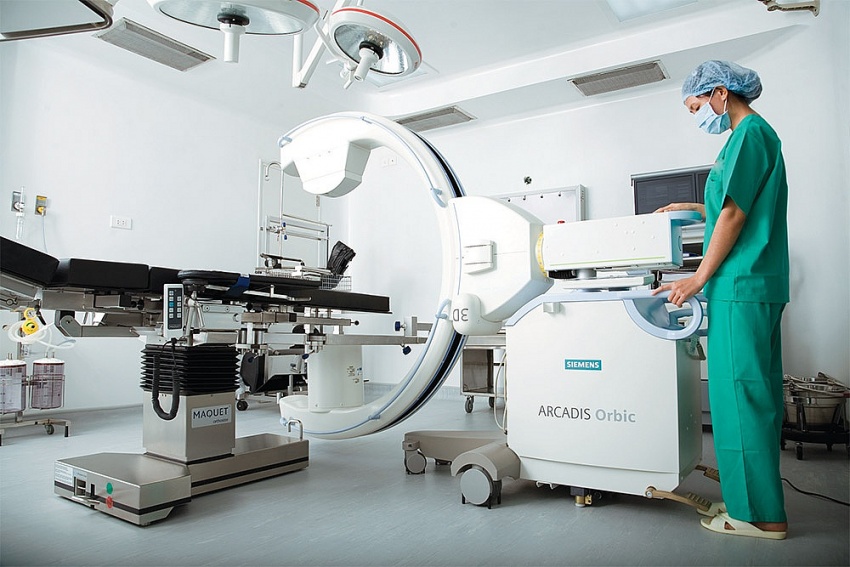E-records in health not yet up to scratch
 |
| E-records in health not yet up to scratch |
Last November, Nguyen Tri Phuong Hospital was recognised by the Ministry of Health (MoH) as the first public facility in Ho Chi Minh City qualified to deploy e-medical records (EMR). The first-class general hospital started to do so in January.
“The most important mechanism needed now is to have a price list for image diagnosis on the Picture Archiving and Communication System (PACS), meaning that instead of printing images, a new system should be built for EMRs. But currently there is no such policy,” said Dr. Luong Cong Minh, deputy general director of Nguyen Tri Phuong Hospital.
“Because of this, the consequence is that Ho Chi Minh City social insurance only pays for image fees, and the remaining costs related to EMRs are paid by the hospital itself.”
To achieve the standards for implementing EMRs, the hospital has invested over $540,000.
“To continue using EMRs, we need to have a specific mechanism. For example, how can we be supported in the IT system; how will the server system be supported; will the price structure be calculated correctly and fully included in exam and treatment costs; and how will the deployment of PACS be supported?” Minh said.
Quang Khoi General Hospital in the central province of Nghe An is in the same boat. Chairman Dr. Nguyen Van Khoi told VIR, “When deploying EMR, Social Insurance yet to pay for the cost of x-ray films on PACS images, so the hospital still has to print films manually, which causes additional cost for us.”
Dr. Tran Quy Tuong, chairman of the Medical Informatics Association, said that if a hospital deploys EMR, eliminating paper medical records, it will be 70 per cent successful in digital transformation. The remaining 30 per cent comes from applying additional technologies such as AI, big data, and high technology.
“However, implementing EMR is a long way away, requiring a lot of time and resources. Unless we have the specific mechanisms for it, we will find it difficult to reach the set targets,” Tuong said.
Currently, more than 50 medical facilities (both public and private) have announced the replacement of paper records with EMRs. Vietnam has about 1,300 exam and treatment facilities nationwide, including about 135 first-class hospitals or higher, according to the MoH.
Medical expert Bao Phi said that first-class hospitals were to deploy EMRs by the end of 2023, but this has not been achieved. Before 2028, all medical treatment facilities must deploy EMRs. However, many obstacles are hindering the deployment, making hospitals hesitant to move forward.
“EMR brings many benefits to patients and health facilities, but during the process of piloting this solution at hospitals, there are some major obstacles. They include costly investment in infrastructure and software systems, lack of qualified manpower, and varied software at hospitals, leading to a lack of common standards,” he explained.
Nguyen Francis Tuan Anh, group advisor on Technology and Solutions at VMED Group added, “We also have to confront these difficulties. For example, when deploying EMR for some hospitals, it must provide free PACS along with EMR deployment. Most hospitals in other nations in the region are equipped with IT infrastructure with appropriate hardware and health systems, such as PACS, before deploying EMR.”
 | Innovation and teamwork will address strain in health By constantly bringing breakthrough innovations to market, Siemens Healthineers enable healthcare professionals to deliver high-quality care, leading to the best possible outcome for patients. Vy Tran, president of Siemens Healthineers Asia-Pacific and Japan, talked with VIR’s Bich Ngoc about the innovation and collaborations keeping the company in the lead. |
 | Expectations rise for medical devices While supporting recent improvements in the process of granting marketing authorisations to medical devices, multinational corporations continue to seek for new positive changes to facilitate their plans. |
 | Private healthcare boosts its presence Together with expansion plans among foreign-invested enterprises, emerging private players are boosting their presence in the promising local healthcare market. |
What the stars mean:
★ Poor ★ ★ Promising ★★★ Good ★★★★ Very good ★★★★★ Exceptional
Related Contents
Latest News
More News
- State corporations poised to drive 2026 growth (February 03, 2026 | 13:58)
- Why high-tech talent will define Vietnam’s growth (February 02, 2026 | 10:47)
- FMCG resilience amid varying storms (February 02, 2026 | 10:00)
- Customs reforms strengthen business confidence, support trade growth (February 01, 2026 | 08:20)
- Vietnam and US to launch sixth trade negotiation round (January 30, 2026 | 15:19)
- Digital publishing emerges as key growth driver in Vietnam (January 30, 2026 | 10:59)
- EVN signs key contract for Tri An hydropower expansion (January 30, 2026 | 10:57)
- Vietnam to lead trade growth in ASEAN (January 29, 2026 | 15:08)
- Carlsberg Vietnam delivers Lunar New Year support in central region (January 28, 2026 | 17:19)
- TikTok penalised $35,000 in Vietnam for consumer protection violations (January 28, 2026 | 17:15)

 Tag:
Tag:




















 Mobile Version
Mobile Version